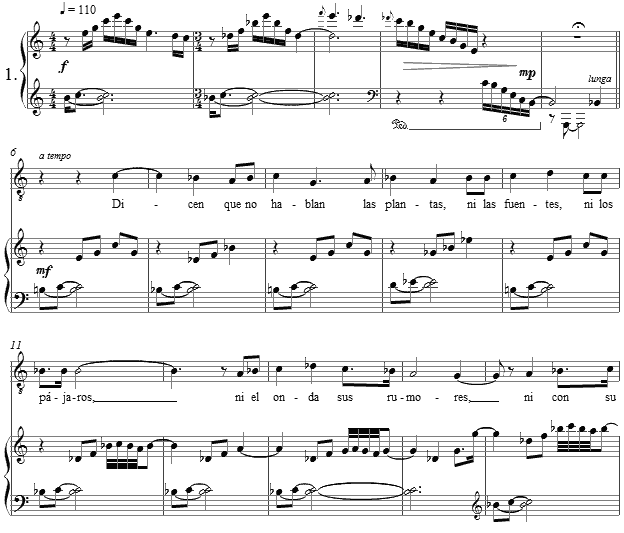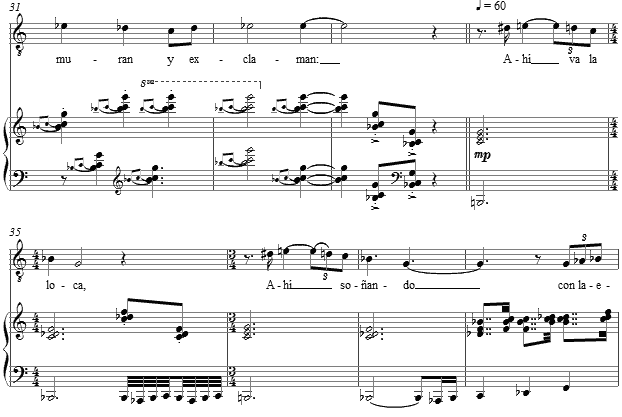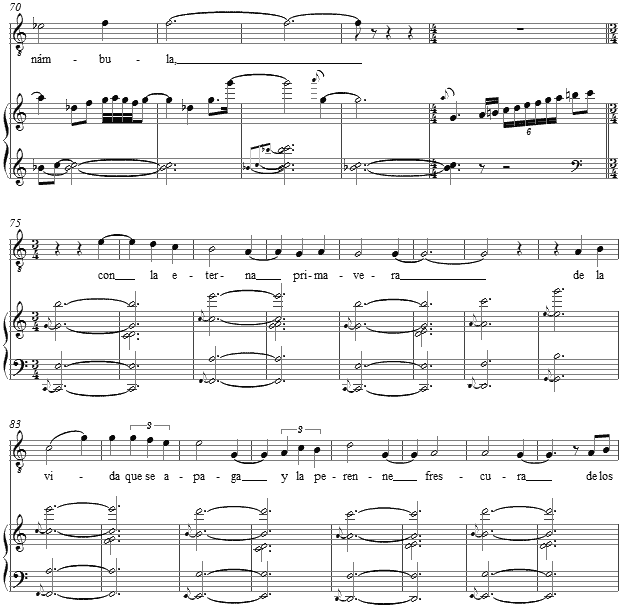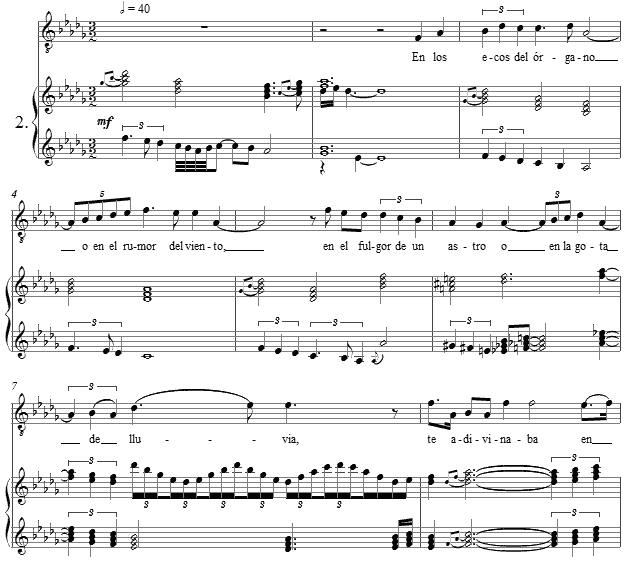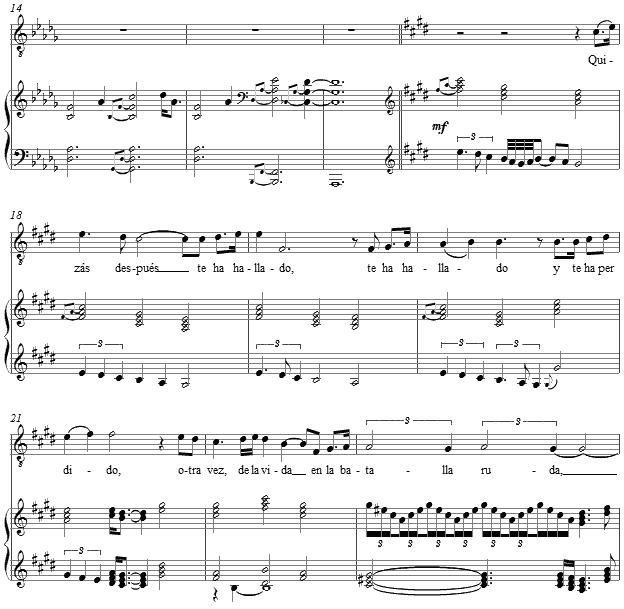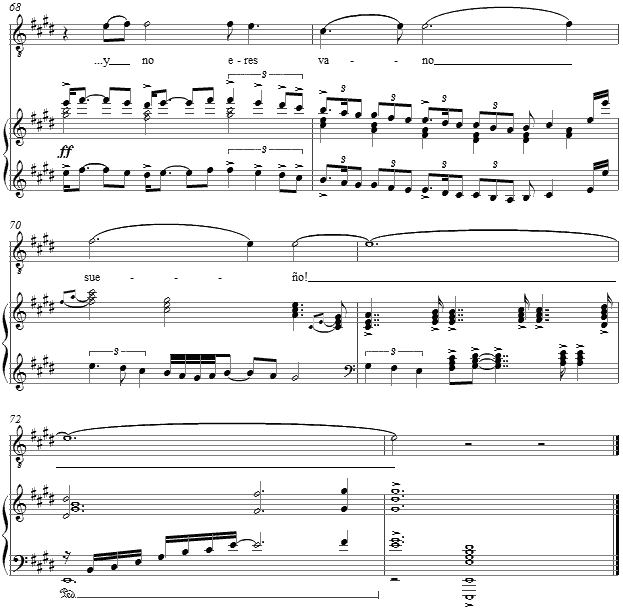Music and Texts of GARY BACHLUND
Vocal Music | Piano | Organ | Chamber Music | Orchestral | Articles and Commentary | Poems and Stories | Miscellany | FAQs
Dos Canciones de Rosalía de Castro - (2008)
for tenor and piano
for Douglas Duno
i. La eterna primavera [ 6 pages, circa 4' 40" ]
Dicen que no hablan las plantas, ni las fuentes, ni los pájaros,
ni el onda con sus rumores, ni con su brillo los astros:
lo dicen, pero no es cierto, pues siempre cuando yo paso
de mí murmuran y exclaman:
-Ahí va la loca, soñando
con la eterna primavera de la vida y de los campos
y ya bien pronto, bien pronto, tendrá los cabellos canos,
y ve temblando, aterida, que cubre la escarcha el prado.
-Hay canas en mi cabeza, hay en los prados escarcha;
mas yo prosigo soñando, pobre, incurable sonámbula,
con la eterna primavera de la vida que se apaga
y la perenne frescura de los campos y las almas,
aunque los unos se agostan y aunque las otras se abrasan.
Astros y fuentes y flores, no murmuréis de mis sueños;
sin ellos, ¿cómo admiraros, ni cómo vivir sin ellos?
ii. No eres vano sueño [ 7 pages, circa 5'30" ]
En los ecos del órgano o en el rumor del viento,
en el fulgor de un astro o en la gota de lluvia,
te adivinaba en todo y en todo te buscaba,
sin encontrarte nunca.
Quizás después te ha hallado, te ha hallado y te ha perdido
otra vez, de la vida en la batalla ruda,
ya que sigue buscándote y te adivina en todo,
sin encontrarte nunca.
Pero sabe que existes y no eres vano sueño,
hermosura sin nombre, pero perfecta y única;
por eso vive triste, porque te busca siempre
sin encontrarte nunca.
Yo no sé lo que busco eternamente
en la tierra, en el aire y en el cielo;
yo no sé lo que busco, pero es algo
que perdí no sé cuándo y que no encuentro,
aun cuando sueñe que invisible habita
en todo cuanto toco y cuanto veo.
Felicidad, no he volver a hallarte
en la tierra, en el aire ni en el cielo,
¡aun cuando sé que existes
y no eres vano sueño![ 15 pages with cover, circa 10' 10" ]
Rosalía de Castro
Rosalía Castro de Murguía, 1837-1885, was a Spanish poet and novelist as well as mother to seven. A native of Santiago de Compostela in the Galicia region of northwest Spain, she wrote in both Galician and Castilian forms of Spanish with her poetry known for its melding of nostalgia, longing and melancholy. Castro's book of verse Cantares gallegos ("Galician Songs") was published in 1863 was seen as the first important poetry in Galician since the 13th century. Her Follas novas (1880) was followed by the despair-filled poems in Castilian, of En las orillas del Sar (1884, By the River Sar), written while Castro was suffering with terminal cancer. Her poetry with its metrical innovations has exerted considerable influence on modern poets, and her place in Spanish culture was honored by her image appearing on the 500 peseta banknote prior to the introduction of the Euro in Spain.
Professor Douglas Duno introduced me to these poems and it is for him that the songs are set and dedicated. For more on this singer and professor of languages, please see my setting of En El Entierro de Un Amigo of Antonio Machado.
The opening of "Eternal spring" is an outburst of two arpeggiated chords, which form the basis of the harmonic vocabulary for the setting, C major with its major seventh in third position, and B flat minor in root position with the added second, C, uniting the two with that common tone. Over this arpeggiated accompaniment the voice sings out.
The exclamation becomes a break in the complexity of the accompaniment, as the chords linger under a recitative-like rhetoric.
A third section breaks the relation between the first two sections of the setting, as a moment of harmonic quietude settles in with the repetition of the line, "with the eternal spring" with its message of peace and renewal. The wide spacing of the chords breaks the previous texture, and as much time as is necessary for the pianist to make these is my intention; they should not be rushed.
The second setting teeters between D flat's harmonic progressions in close triadic harmonies, and the next section which is foreshadowed by the A major seven chord at measure six as the alternative harmonic domain for this setting.
The foreshadowing becomes the new key as the gestures now are voiced in this new tonal domain.
The final moments of the setting are rhapsodic with their passionate octaves and final fortissimo retelling of the opening theme, as the voice exclaims with certainty, "...and you are not a dream!"
The score for Dos Canciones de Rosalía de Castro is available as a free PDF download, though any major commercial performance or recording of the work is prohibited without prior arrangement with the composer. Click on the graphic below for this piano-vocal score.
Dos Canciones de Rosalía de Castro

